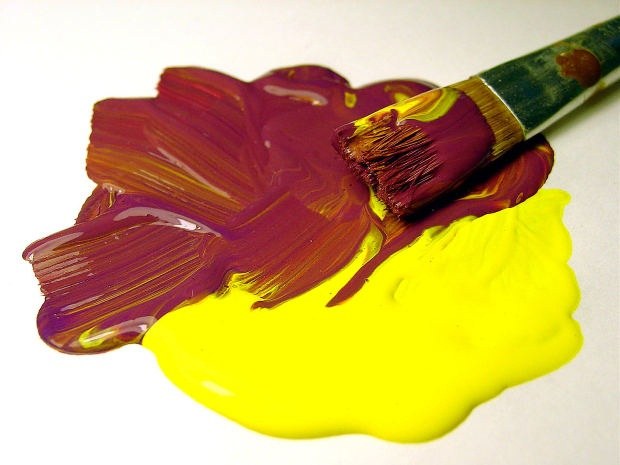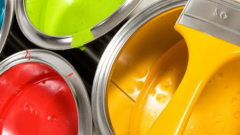In the manufacture of oil paints as a film-forming substance we use natural linseed oil, the basis for which are vegetable oils such as hemp, soy, canola, cotton, linen and others.
In the manufacture of alkyd paint film-forming substance is alkyd varnish prepared on the basis of the solution pentaphthalic or glyptal oil-based oligomeric resin in organic solvents. Alkyd paint is used successfully inside and outside the premises, covering materials such as metal, wood, masonry.
Also important is the fact that for complete drying of oil paints is necessary for several days. In some situations indoors you can't use oil paints because they emit fairly large quantities of volatile hazardous substances.
Another big downside of oil paints is that after a couple of years any oil coating acquires an unpleasant yellow tinge, while changing its original color.
The main advantage of oil paints is their relatively low cost. But if to speak about qualitative characteristics, such as strength of the formed film, the purity of color, the appearance, in this case, alkyd paints is largely superior to oil.
One of the advantages of a number of alkyd paints is a high degree of opacity, which is a crucial factor in protecting wood or metal surfaces from corrosion and moisture. This feature is created due to a high rate of surface tension in alkyd resins.
In comparison with alkyd oil paints are more durable and can withstand aggressive environment. Practice has shown that this type of paint is more resistant to household chemicals and detergents than oil or water soluble.
Thanks to these qualities possessed by alkyd paints, they are increasingly used in finishing and repair work.
In the manufacture of alkyd paint film-forming substance is alkyd varnish prepared on the basis of the solution pentaphthalic or glyptal oil-based oligomeric resin in organic solvents. Alkyd paint is used successfully inside and outside the premises, covering materials such as metal, wood, masonry.
Disadvantages of oil paints
Also important is the fact that for complete drying of oil paints is necessary for several days. In some situations indoors you can't use oil paints because they emit fairly large quantities of volatile hazardous substances.
Another big downside of oil paints is that after a couple of years any oil coating acquires an unpleasant yellow tinge, while changing its original color.
Quality or price?
The main advantage of oil paints is their relatively low cost. But if to speak about qualitative characteristics, such as strength of the formed film, the purity of color, the appearance, in this case, alkyd paints is largely superior to oil.
Have to the choice of alkyd paints is the fact that the availability of products with a wide range of colors.
One of the advantages of a number of alkyd paints is a high degree of opacity, which is a crucial factor in protecting wood or metal surfaces from corrosion and moisture. This feature is created due to a high rate of surface tension in alkyd resins.
High wear resistance
In comparison with alkyd oil paints are more durable and can withstand aggressive environment. Practice has shown that this type of paint is more resistant to household chemicals and detergents than oil or water soluble.
If necessary, alkyd paint diluted with white spirit. Alkyd paints themselves smell almost do not emit.
Thanks to these qualities possessed by alkyd paints, they are increasingly used in finishing and repair work.



